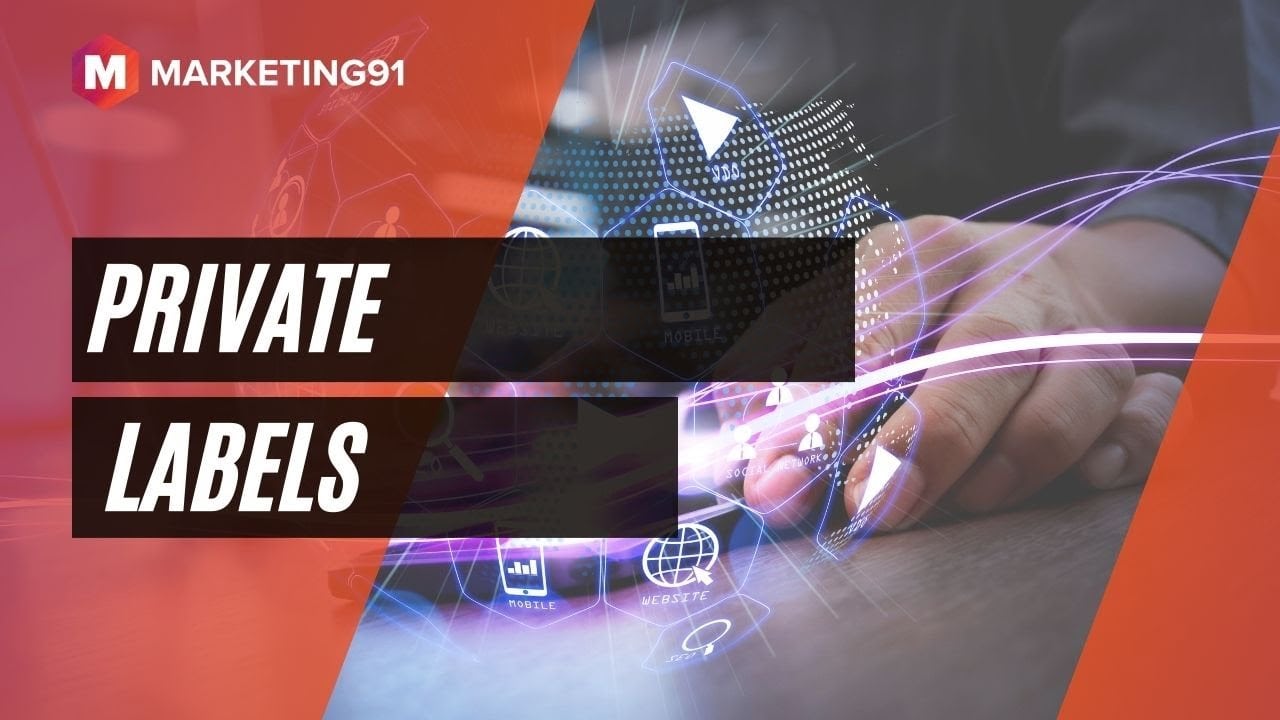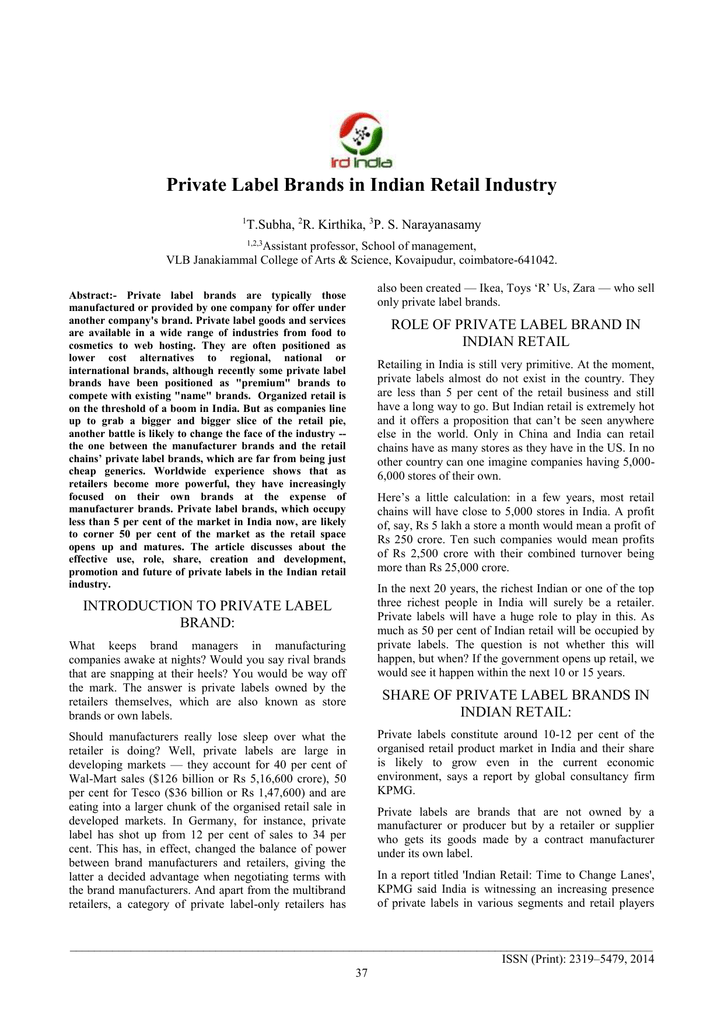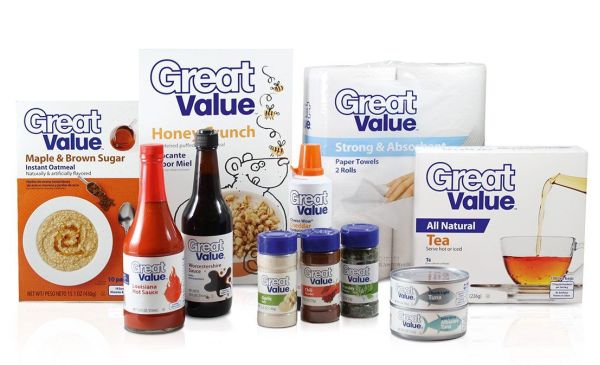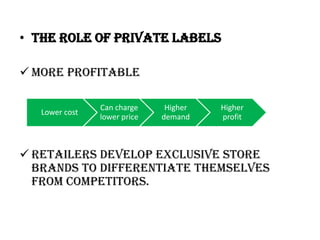41 role of private labels
When Do Private Labels Succeed? - MIT Sloan Management Review private labels represent a sizable fraction of general merchandise retailing. 2 our focus is on store brands in the food retailing industry, where they accounted for 13 percent of u.s. supermarket sales in the year ending 30 june 1991. 3 in that period, sales in all u.s. grocery stores amounted to $368.5 billion, implying private label sales of … White Label vs Private Label - How It Works | Sellbery In fact, private labels are mostly used for physical goods. There are plenty of cosmetic products, clothing, and home items, etc., marked with private labels. Along with it, the majority of people do not even know about the actual origin of products. Private Label Examples The main advantage of the private label is the low price of the products.
Private label products — benefits and challenges - estar.eu 4 Jul 2022 — The numbers and percentages around private label brands and products reveal a very important role in global markets. Private labels are ...
Role of private labels
Private Label: Meaning, How It Works, Advantages and ... - Penpoin In terms of market share, private label contributions vary between countries.In the United States, private labels account for about 15% of total supermarket sales. In Indonesia, it contributes less than 20% of total sales in modern retail. Meanwhile, a Nielsen study in 2014 showed that the global average market share was around 16.5%. Private label advantages The role of private label tiers and private label naming strategies in ... Purpose The evolution of private labels (PL) is a recent trend in the retail industry: many retailers now manage a PL portfolio that includes multiple value propositions, as well as various brand... The Advantages of Private Label Branding | Your Business Private label branding is one way to separate yourself from competitors. One of the greatest attributes of private labels is that you inherently have an exclusive right to sell the products. If you market the brand well and create demand for it, you benefit as your customers' only source. This contributes to your ability to charge premium ...
Role of private labels. Brands Versus Private Labels: Fighting to Win - Harvard Business Review Over the past 20 years, private-label market share has averaged 14 % of U.S. dollar supermarket sales. In the depth of the 1981-1982 recession, it peaked at 17 % of sales; in 1994, when private ... (PDF) Private Labels: The role of Manufacturer ... - ResearchGate Findings indicate that the influence of private label image and perceived quality on purchase intention are partially mediated by loyalty and moderated by manufacturer identification. Results also... Why Retailers Need Their Own Private Labels | The Studio With a private label, you not only have more control over your branding - you also have more control over supply chains. Owned brands give retailers the opportunity to either bring design, sourcing, manufacturing, and distribution in-house, or at least have the final say on who fulfills those roles. The New Appeal of Private Labels - Harvard Business Review Supplying private labels brings manufacturers closer to retailers and allows manufacturers to play a greater role in category development. Ralston, for example, ...
What is Private Label - Shopify A private label product is manufactured by a contract or third-party manufacturer and sold under a retailer's brand name. As the retailer, you specify ... The battle for brands in a world of private labels Private labels represent 20 percent of grocery store and 18 percent of supercenter sales. 4 Furthermore, store brand products were 31 percent cheaper across product categories than their national brand counterparts. 5 Store brands are not just a recession related phenomenon - U.S. store brand sales continue to grow over the long run despite ... The Role of Brand Management In a Private Label Environment Private Labels allow brands to fill these hole by tapping into the psyche of their customers. The ideas that nationwide brand names represent quality is diminishing, and that many consumers are... Private labels play leading role for food and drug retailers private-label products that can match or even exceed national brand quality. "Helping consumers save money has always been a key element, but the role of private label has shifted dramatically ...
The future of Private Brands and its Role in Retail - BRAND SECRETS AND ... Private Label quality continues to improve beyond its sales growth. Retailers & Private Label manufacturers should leverage its strengths Private labels: The role of manufacturer identification ... - Emerald The purpose of this paper is to analyze product, retailer, and individual factors from the private label brand that influence consumers' loyalty and purchase intention; along with the influence of the manufacturer identification on the product package on purchase intention. Design/methodology/approach Private label - Wikipedia A private label, also called a private brand or private-label brand, is a brand owned by a company, offered by that company alongside and competing with brands from other businesses. [1] [2] A private-label brand is almost always offered exclusively by the firm that owns it, although in rare instances the brand is licensed to another company. [3] Private labeling: Process, Advantages, and Disadvantages - Marketing91 Advantages of private labeling #1 Reduced Competition: If you run a retail store where you have to keep the products price according to your competitors, then private labeled products will be a boon for you. Most of the times, you can buy products from a supplier without their label on the products.
Private Label Brands Roar At Retail - Forbes Private label helps manufacturers who need capacity, creates loyalty for retailers who can get bigger margins, and is good for the consumer, especially if it includes low-cost, high-end, and ...
Private Label Manager Job Description | Salary.com Requirements and Responsibilities. Private Label Manager is responsible for the design and production of products for private labels. Develops merchandising strategies, budgets, sales targets, and profit objectives. Being a Private Label Manager ensures that the label meets sales and profit goals. Requires a bachelor's degree in area of specialty.
THE ROLE OF PRIVATE LABELS IN ANTITRUST - Oxford Academic Private labels now play a key role in a wide range of industries. Consequently, it is crucial that antitrust practitioners fully understand how private labels can affect the level and nature of competition in the markets in which they are present.
Turning private labels into powerhouse brands - McKinsey & Company Even as retailers have introduced new private-label products and brands over the years, few have thought through the role of private labels in their businesses. Some private-label brands and products come into being simply because, for instance, a vendor offers to make a product at a lower cost and higher margin rate than a national brand.
The Role of Private Brands and the Retail Planning Process - River Logic This approach will provide consumers with a full range of product and service levels they might ever need. Drawbacks to the private label strategy include manufacturers possibly foreclosing access to some products, or limiting trade spend dollars available to certain accounts.
How Private Labels Can Own 2022 - Winsight Grocery Business not only will dedicated groupings such as these help private brands' biggest fans—those more likely to be shopping online in the first place—find and discover a wider range of products from labels they know and trust, but also they represent an efficient way for a growing cohort of price-conscious consumers to more easily shop an assortment that …
The role of private label tiers and private label naming ... - Emerald The evolution of private labels (PL) is a recent trend in the retail industry: many retailers now manage a PL portfolio that includes multiple value propositions, as well as various brand name strategies. Little research has been done, however, on how this combination of PL strategies conditions the results of the retailer that manages them.
Private Labels: Their growing importance in Retailing Private labels are one such tool to build competitive advantage through creating cost leadership. In building customer relationship, the Private labels provide a win-win solution. The retailers gain better bargaining power over their suppliers and better margins while the customers get a wider choice of prices.
Role of Private Labels, Private-Label Success Factors - Ebrary Role of Private Labels Why do intermediaries sponsor their own brands? First, these brands can be more profitable. Intermediaries may be able to use manufacturers with excess capacity that will produce private-label goods at low cost.
What is Private Label Branding: A Beginner's Guide Private label allows you to outsource the manufacturing of products to a company then purchase the rights for selling them. You may have purchased private label products before in supermarkets. Private label brands make up 15% of supermarket sales. And while it seems like a small figure, there is foreseeable growth to niche private label brands.
4 Benefits of Private Labeling for Your Brand — Century Label Private label products use the retailer's private label brand. It is up to the end retailer to design the manufacturing, packaging, and marketing - not up to you as the creator of the good, eliminating added costs. You only pay the product cost without a premium for brand name or expensive marketing campaigns. Lower Operating Costs
What is Private Labeling? [Definition, Pros, Cons & More] - Ecommerce CEO A private label manufacturer works with a brand to sell products under the manufacturer's name. The manufacturer isn't given any credit on the label. The products may be sold independently, or to support other products. For instance: Let's say a coffee company sells its coffee to other companies so that they can use it as an ingredient.
The impact of private labels on consumer store loyalty: An integrative ... This research studies the role of private labels (PLs) on consumers' store loyalty. It offers an integrative approach that comprises several store loyalty drivers (in-store and economic factors), analyzing the role that PLs play among different types of retailers. Data were collected through an online survey.
The Advantages of Private Label Branding | Your Business Private label branding is one way to separate yourself from competitors. One of the greatest attributes of private labels is that you inherently have an exclusive right to sell the products. If you market the brand well and create demand for it, you benefit as your customers' only source. This contributes to your ability to charge premium ...
The role of private label tiers and private label naming strategies in ... Purpose The evolution of private labels (PL) is a recent trend in the retail industry: many retailers now manage a PL portfolio that includes multiple value propositions, as well as various brand...
Private Label: Meaning, How It Works, Advantages and ... - Penpoin In terms of market share, private label contributions vary between countries.In the United States, private labels account for about 15% of total supermarket sales. In Indonesia, it contributes less than 20% of total sales in modern retail. Meanwhile, a Nielsen study in 2014 showed that the global average market share was around 16.5%. Private label advantages



























:format(webp)/cdn.vox-cdn.com/uploads/chorus_image/image/56124895/tj_lead.1502298009.jpg)



Post a Comment for "41 role of private labels"